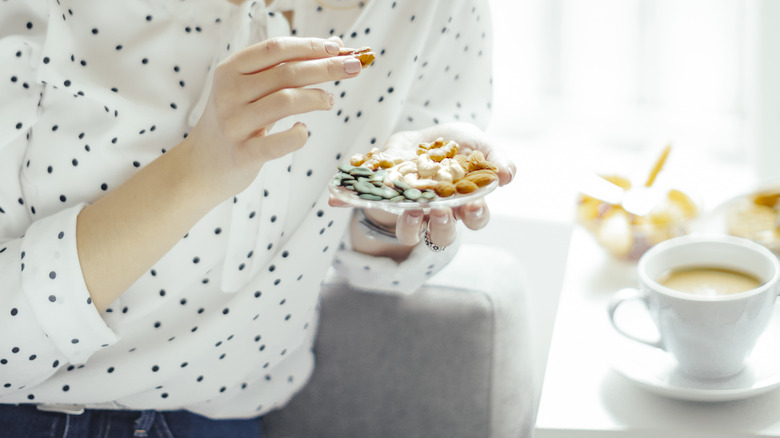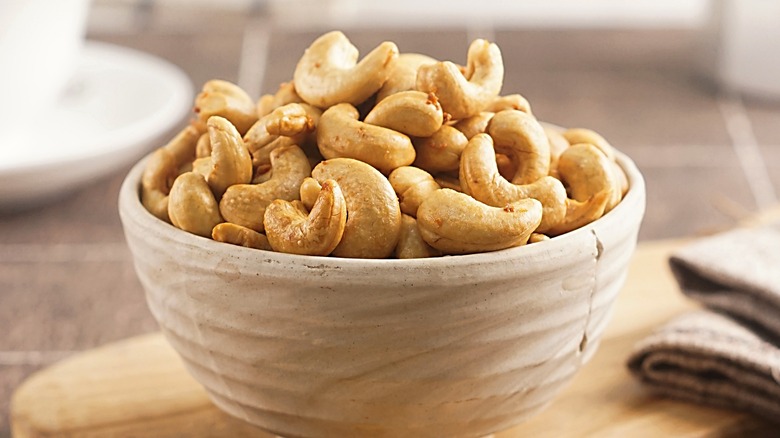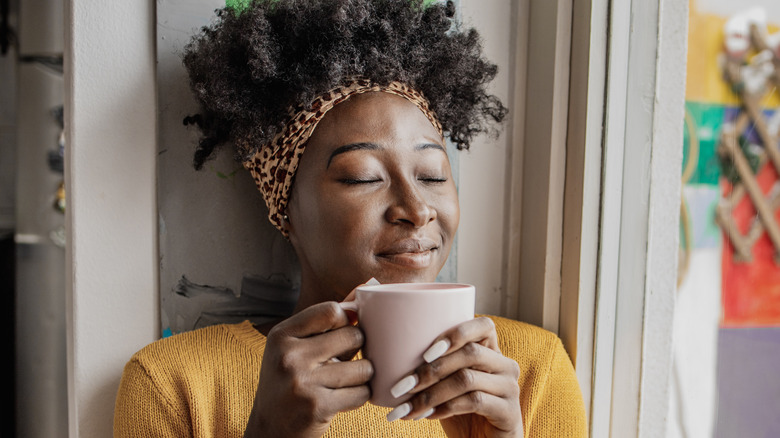Why You Should Avoid Eating Cashews And Drinking Coffee At The Same Time
In the middle of a hectic day at the office, sometimes all we have time for is a quick snack to keep us going. In a pinch, a cup of coffee and a handful of cashews might sound like the perfect mix. After all, both can refuel our energy — one with caffeine and the other with its copper and healthy fat content (per Healthline). However, while coffee and cashews each have their distinct health benefits, combining the two might result in us getting less of one of the cashews' most abundant nutrients.
A 100-gram serving of raw cashew nuts gives you over 18 grams of protein, 3.3 grams of fiber, 660 milligrams of potassium, 593 milligrams of phosphorus, and 292 milligrams of magnesium, according to the U.S. Department of Agriculture (USDA). While these nutrients may be the stars of cashews' nutritional profile, cashew nuts also give us a hefty dose of iron — 6.68 milligrams in that same 100-gram serving, to be exact. Iron plays an essential role in our circulatory health, ensuring that our muscles and the rest of our body get the oxygen they need (per National Institutes of Health). But depending on how we time it, drinking coffee may hinder iron absorption, reports the UK's Scientific Advisory Committee on Nutrition (SACN).
Coffee may interfere with the absorption of cashews' iron
If you're a dual fan of coffee and cashew nuts, take comfort in knowing that you don't necessarily have to pick one over the other. Rather, the link seems to lie in the simultaneous consumption of coffee and food items that are high in iron, like cashews. This was evidenced in an early 1983 clinical trial published in The American Journal of Clinical Nutrition, in which participants with healthy iron levels experienced a 39% drop in iron absorption when a cup of coffee was consumed with a hamburger meal. However, this was not the case when participants drank coffee 60 minutes prior to eating, indicating that staggering our coffee consumption might bypass this potential effect. That being said, inhibition of iron absorption was observed in association with drinking coffee one hour after a meal.
If you think you might be better off if you switch from coffee to tea, the study findings also showed that simultaneous ingestion of tea with a hamburger meal decreased iron absorption to an even greater degree by 64%.
What is it about coffee that interferes with iron absorption?
While caffeine may offer a partial explanation for this relationship, as it has been shown to have a minor effect on iron absorption, coffee's polyphenol content may also be involved (per Healthline). While these compounds have been linked with numerous health benefits, research shows that polyphenols bind to iron in the cells of the intestines, preventing the nutrient from making its way into the blood. It is instead dispelled from the body as waste, explains Penn State.
Such findings are of particular importance for people who may be susceptible to iron deficiency. The SACN highlights how children, girls, women of reproductive age, and some older adults may be at higher risk for iron deficiency anemia. Those with the condition may experience weakness, headache, chest pain, pale skin, cold hands and feet, low appetite, and more. Avoiding simultaneous ingestion of coffee and cashews may be one protective measure to take, as well as eating iron-dense foods alongside those that promote iron absorption. Even so, experts emphasize that eating a well-rounded diet to diversify your iron food sources is more important in supporting healthy iron levels than trying to nail down the timing of these foods.


